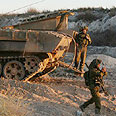
IDF (Illustration)
צילום: AFP
To cut or not to cut?
Head to head: Two views on whether Israel has luxury to cut its defense budget
Yakir Elkariv – Yes
The question of whether to cut the defense budget is to a large extent a rhetorical question: The positive response is already known. The only question is to what extent we can reach into this deep pocket.
The real surprise has to do with the budget’s structure: It turns out that out of the NIS 50 billion or so almost half is dedicated every year to paying the salaries and pensions of career officers. The defense establishment says this portion of the budget is “fixed” and claims it has no access to it whatsoever.
As to what is left, some NIS 26 billion, we are being told that we cannot cut it without significantly undermining our ability to safeguard national security.
This is of course the point where the following questions emerge: Defend us against whom? Jordan’s immense army? The crumbling Syria? The Libyan threat? After all, the chances of an old-style war breaking out in our region are almost nil. Today we are dealing with, at most, an operation that will take several days and be managed like an election campaign – while keeping a close eye on public opinion.
The combat theater has changed as well: If once upon a time we dealt with armored columns fighting in the desert, today a tiny, armed drone controlled from an air-conditioned command center at IDF Headquarters can do the job of an entire platoon and prevent casualties among our forces.
Technology made combat cheaper and more lethal. Once upon a time we had to risk a patrol unit to find out what’s going on beyond a hill. Today we can immediately produce a detailed satellite photo.
However, the establishment, as establishments tend to do, is fighting for its existence, assets and resources. When facing the political establishment, the military gets carried away with describing the existential threats hanging over our heads. Here we need strong nerves and plenty of experience in order to face this immense establishment and stay away from the familiar rhetoric.
We must keep in mind that the money to be cut from the defense budget won’t go to waste: It’s needed like oxygen for the education, welfare and health budgets and in other economic sectors that are collapsing under the burden of real cuts, which prevent vital services from being provided to citizens.
If there is one genuine product of the social protest that emerged here a few months ago it would be the shift of a few billions from the defense budget to places where this money will offer a more genuine contribution than defending us from some kind of ethereal threat.
And should some Ayatollah in Iran decide – in a year, or two, or five years – to drop the bomb on us, a billion here or there won’t make any difference.
Hagai Segal – No
At the central slaughterhouse for sacred cows, the final preparations are being completed ahead of the defense budget’s arrival. For many years now, the people there have been fantasizing about turning the sacred defense cow into meatballs, and now a golden opportunity has emerged to realize this dream.
The people want social justice and a small army, and if the people want this, Trajtenberg must approve. This nice and wise man has slight populist tendencies. From the moment his committee was established he signaled that the defense budget shall undergo a significant diet.
Should the IDF continue to be a sacred cow? Not at all. Are we not allowed to cut even one shekel from the defense budget? Cutting is allowed. From time to time, our leaders must carefully examine Israel’s real security needs and calculate their budgets accordingly. There are no sacred tanks in the IDF and no Iron Dome system that we cannot forego.
Moreover, we can certainly force the IDF’s General Staff to delay the retirement of career officers. A 42-year-old Major does not have to retire and receive a generous government allowance for the rest of his life. He can continue to serve until the age of 60 at least.
The problem is that most budget cut fans do not wish to streamline the IDF; they want to weaken it, and we must certainly not agree to that. Note that the campaign for cutting the defense budget is not headed by leaders of the protest tent alone; it is also being spearheaded by senior peace activists who believe in agreements with Abbas more than they do in the IDF’s power.
Too many people with megaphones or a TV show believe that a strong IDF is an obstacle for peace.
If they are right, and our peace with Abbas will be genuine, then we truly have no need for an army of great resources; a Swiss-style army would be enough. However, they are wrong, and for this mistake we may end up paying with our very existence.
Once our neighbors attack, one of these days, we will not have enough jets and submarines to survive. Just like in 1973, we will again desperately require massive American aid. However, this aid too is expected to undergo destructive cuts in the meantime. Each nation has its own Trajtenbergs to deal with.
- Follow Ynetnews on Facebook
- Receive Ynetnews updates directly to your desktop










